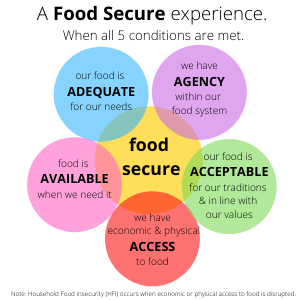What is Food Security?
One working definition of food security
Let's start with Household Food Insecurity
Over 14% of Manitobans, 60% of Northern residents living on-reserve and over 1 in 5 children across the province experience Household Food Insecurity (HFI) meaning they don’t have enough money to buy food.
COVID-19 intensified the financial precariousness that drives poverty along with Household Food Insecurity. While the HFI experience is new to some and an experience of many it is experienced disproportionately by Indigenous and Black households.
Covid-19 brought food security and household food insecurity to the forefront of a necessary, and long overdue national conversation.
In truth, the pandemic has simply drawn attention to concerns regarding food security and equity that have been around much longer.
So, what exactly is ‘food security’?
Food security is an experience, and one that exists when all people have what they need to eat well, all the time. This experience is unique to each person.
The food secure experience differs for everyone because, although we all eat, everyone has different expectations for and relationships with food.
We all have unique traditions and customs, favourite ingredients, varying connections to the land and where our food comes from, different financial situations, diverse preferences and physiological needs, different grocery resources, and so many other factors.
This means there isn’t any single definition of what food security looks like, or one ultimate strategy to make that a reality.
The 5 A's of a food secure experience
One way we can measure this food secure experience is a concept called the 5A’s.
According to Ryerson’s Centre for Studies in Food Security, the 5A’s can be characterized as:
Available: There is always enough food for all people
Adequate: All people can have nutritious food that meets their physical, emotional, and spiritual needs
Acceptable: All food is produced and consumed in culturally-appropriate, sustainable, and dignified ways
Accessibility: All people can eat well, free from physical, economic, social, or political barriers
Agency: All people understand, benefit from, and can make changes to the food system.

Where does food insecurity come from?
To satisfy the 5 conditions of a food secure experience, individuals and communities not only have different expectations, needs and relationships to balance while navigating their food experiences – they may also experience diverse barriers to a food secure experience.
We can’t meaningfully unpack the food secure experience without examining the complex and interconnected larger and systemic influences which impose upon and challenge it.
What we CAN do about food insecurity
Given what we have learned, what should we be doing about food insecurity?
We know that excellent research says NOT to invest in charitable, food-driven programs to solve food insecure experiences – that these experiences are created by poverty (and are not solved or mitigated in any meaningful way by short term food-driven community programs). Many great advocates are working on precisely this poverty-reduction approach to address with household food insecurity as a product of the overall material deprivation of poverty (it’s not just food that’s missing).
We don’t disagree.
And we also acknowledge that there are also powerful and important locally-driven food movements, working to reduce harm and improve food security from within community.
We offer support to both these community development initiatives, as well as support poverty-reduction policy reform. At Food Matters Manitoba, we recognize the importance of pursuing both strategies as complimentary approaches. Policy reform, and community development initiatives can function collaboratively to create and strengthen a farther-reaching web of support.
Food-driven programming can focus on urgent right-now needs, and many of these works already operate outside of a charitable model, and rather are community initiatives focused on building capacity. These programs are able to include opportunities for individual empowerment and agency, while also working towards mid to long-term community-centred food security.
Simultaneously, folks working on food policy reform and poverty-reduction coalition work can strive for the ultimate goal of universal sufficient income, land sovereignty, and the capacity for individually-driven engagement in food systems.
